This article was medically reviewed by Janice Litza, MD. Dr. Litza is a board certified Family Medicine Physician in Wisconsin. She is a practicing Physician and taught as a Clinical Professor for 13 years, after receiving her MD from the University of Wisconsin-Madison School of Medicine and Public Health in 1998.
There are 13 references cited in this article, which can be found at the bottom of the page.
This article has been viewed 39,483 times.
Colds are commonly due to infection with a virus, but coughs can be due to a number of things, including infections with viruses, bacteria, and fungi. Coughs can be either productive — wet coughs that produce mucus, or non-productive — dry coughs with no mucus. If you have a cold and a cough, there are things you can do to help get rid of them.
Steps
Treating the Cold and Cough Medically
-
1Take a pain reliever. Colds are usually accompanied by aches and pains. You can take acetaminophen (Tylenol) or NSAIDs (Aleve, Advil) to help relieve pains.[1]
- Aspirin should not be given to children and teenagers under 19 due to the risk of Reye's Syndrome.
-
2Take over-the-counter cold medicines. You can try OTC cold medications, but there is very little actual evidence that they work much better than rest, fluids, and nutrition. The OTC medications can help with symptoms, however.
- Read the labels of all medicines and talk to your pharmacist about possible interactions. Some medications (such as Claritin-D and Benadryl Allergy/Cold) contain multiple ingredients. So if you take Benadryl Allergy/Cold (which contains acetaminophen, diphenhydramine, phenylephrine) and also take Tylenol (acetaminophen), you may inadvertently overdose.
- Decongestants can help clear a stuffy nose and can be used as pills or as nasal sprays. Don’t use these for longer than three days.[2] Try pseudoephedrine (Sudafed) or oxymetazoline (Afrin nasal spray).
- Antihistamines can be used for coughs due to allergies. Antihistamines containing diphenhydramine can make you sleepy . Antihistamines, like loratadine (Claritin, Claritin RediTabs, Alavert), do not usually make you sleepy.
- Expectorants are cough medicines for wet, mucus productive coughs because they help bring up mucus.[3] Cough suppressants reduce coughing.
Advertisement -
3Use a menthol rub. Topical ointments containing camphor and menthol, such as Vick’s VapoRub and Mentholatum, have been traditionally used for coughs and sinus congestion. Just rub a small amount onto your chest and around your nose.[4]
-
4Call your doctor. If you are not seeing a physician and these treatments don’t give you any relief within five to seven days, make an appointment to see a physician. You may be dealing with a more complicated situation. If you experience certain symptoms, call your physician for an appointment. These symptoms include:
- Coughing up thick and/or a greenish-yellow phlegm
- Wheezing, or there is a whistling sound at the beginning or end of the breath
- Odd sounding coughs and having difficulty with breathing at the end of a cough
- Experiencing a fever (over 102°F or 38.9°C in infants three to six months; 103°F or 39.4°C in children and adults)
- Experiencing any shortness of breath
Getting Rid of Colds and Coughs With At-Home Remedies
-
1Get plenty of rest. One of the most effective ways to get rid of a cough and cold is to rest. This means getting extra sleep, up to 12 hours a night.[5] Take a day off from work or school if you need to, which will have the added bonus of avoiding getting coworkers and classmates sick.
-
2Use a humidifier. Keeping the air humid can help make you feel better when you have a cold. You can use a vaporizer or humidifier. Another way to breathe humid air is by taking hot, steamy showers.[6]
- Put essential oils in your humidifier, like eucalyptus oil. You can also place a cloth with eucalyptus oil on it in the shower with you. Let the water hit the cloth and release the scent.
-
3Drink fluids. Drink plenty of warm fluids, especially water. Drink lots of water. At a minimum, try to drink eight to 10 8-ounce glasses of water a day. Drinking water helps with congestion and mucus.[7]
- You can also drink juices, clear chicken broth, herbal teas, or vegetable broths.
- Avoid alcohol and caffeine.
- You can add honey and lemon to the water or tea.
-
4Eat a healthy diet. When you are sick, it is important to get the nutrients your body needs to heal itself. Good food full of vitamins and minerals also boosts your immune system, which can help you fight your cold.
- Make sure you are getting enough vitamin B complex, vitamin C, zinc, and copper. You can take supplements to make sure you get enough of these vitamins and minerals.[8]
-
5Eat soup. Sipping, or eating, warm liquids like soup is a traditional remedy in many cultures. This includes chicken soup.[9] Hot, spicy soups are used in Asian healing treatments. The soups include red pepper, lemongrass, and ginger.[10]
- Spicy foods can promote sinus drainage and help ease cold symptoms.
- Garlic, onions, and mushrooms are foods that help with inflammation and provide anti-oxidants.
-
6Gargle with warm salt water. The salt water helps reduce any swelling in your throat, making a cough less likely. Add one teaspoon of sea salt (or table salt if you don’t have any sea salt) to about six ounces of water. Stir to dissolve and gargle.[11]
- The sea salt may also help supply various minerals that can be useful for the immune system, like zinc, selenium, magnesium.
Treating Colds and Coughs With Unverified Herbal Remedies
-
1Use honey. Honey has both antibacterial and antiviral properties.[12] Any organic honey will have these properties, but you can also try medicinal honey, such as Manuka honey from New Zealand. Gently warm up one cup of honey, and then add three to four tablespoons of freshly squeezed lemon juice to the warm honey. If you only have bottled lemon juice, use four to five tablespoons. When you need the cough medicine, take one to two tablespoons as needed.
- You can also cut a washed, whole lemon into thin slices (along with the skin and the seeds) and add to one cup of honey. Heat on a low flame for ten minutes with constant stirring, breaking up the lemon slices as you stir. Add ¼ to ⅓ cup water to the honey-lemon mixture and stir in while heating over the low flame. Refrigerate the mixture and take a tablespoon as needed.
- Lemon is often added because lemon juice contains high levels of Vitamin C. The juice of one lemon contains 51% of the daily Vitamin C requirement. Lemon juice also has antibacterial, and antiviral properties.
- You can also add garlic to the mixture. Garlic has antibacterial, antiviral, antiparasitic and antifungal properties, and stimulates the immune system. Peel two to three cloves of garlic and chop them as finely as possible. Or you can try ginger, which acts as an expectorant. Cut and peel about 1.5 inches of fresh ginger root and finely grate it. Add either to the honey-lemon mixture before you add water.
- Do not give honey to any child under 12 months of age because there is a small risk of getting infant botulism.[13]
-
2
-
3Use an expectorant herb. Expectorant herbs are herbs that help increase the secretions and thin out them to make it easier to cough up the phlegm. Be aware that these are not necessarily meant to be consumed but diluted and applied to the skin or inhaled; some of these herbs may be toxic if ingested. These essential oils or dried herbs have antibacterial, antifungal, or antiseptic properties in addition to the expectorant properties, meaning they can kill bacteria and other microorganisms that can infect the sinuses and cause colds. Talk to your doctor before using any of these herbs, especially if you are taking other medications, are pregnant, or want to use them on a child. Readily available herbs that function as expectorants include:
- Eucalyptus
- Elecampane (Inula)
- Slippery Elm
- Fennel seed
- Camphor
- Hyssop
- Lobelia
- Mullein
- Thyme
- Spearmint and Peppermint
- Ginger
-
4Make a tea. Take one teaspoon of your choice of dried herb (or three teaspoons of fresh herb) and steep in one cup of boiled water. Let it steep for five to 10 minutes. Drink four to six cups a day, sipping the warm tea throughout the day.
- You can add some honey and lemon to taste.
-
5Try an herbal steam. The steam method allows the herbal remedies to get directly into the lungs and act quickly and effectively. Steam can also help open up the nasal passages and help thin out any mucus. You can use either the dried herbs or the essential oils of many of these herbs. Both can be effective and depend on your preferences and what you have available.
- Add one to two drops of any of the expectorant essential oils or one to two teaspoons of dried herb. Start with one drop to one quart of water. Once you add the herbs, boil for another minute, turn off the heat, move the pot to a comfortable area, and begin steaming.
- Cover your head with a large, clean cotton towel and place your head over the steaming pot. Close your eyes. Keep your face at least 12 inches away from the water. You want the heat to enter your nose, throat and lungs, but not burn yourself with heat.
- Breathe in through your nose and out through your mouth for five counts and then in and out through your mouth for two counts. Repeat for 10 minutes or as long as the water is still steaming.
- Try to blow your nose and cough during and after the treatment.
- You can do this every two hours or as often as your schedule permits.
References
- ↑ https://my.clevelandclinic.org/health/drugs/11086-non-steroidal-anti-inflammatory-medicines-nsaids
- ↑ http://www.medicinenet.com/otc_cold_and_cough_medications/views.htm
- ↑ http://www.medicinenet.com/otc_cold_and_cough_medications-page2/views.htm
- ↑ https://www.umms.org/bwmc/patients-visitors/health-library/drug-notes/notes/camphor-menthol-on-the-skin
- ↑ https://my.clevelandclinic.org/health/diseases/12342-common-cold
- ↑ http://www.webmd.com/cold-and-flu/understanding-common-cold-treatment
- ↑ https://my.clevelandclinic.org/health/diseases/13756--colds-and-flu-symptoms-treatment-prevention-when-to-call
- ↑ http://www.webmd.com/cold-and-flu/understanding-common-cold-treatment?page=2
- ↑ https://www.pennmedicine.org/news/news-blog/2018/november/why-do-we-eat-soup-when-we-have-a-cold
- ↑ http://www.webmd.com/cold-and-flu/understanding-common-cold-treatment?page=2
- ↑ https://www.pennmedicine.org/updates/blogs/health-and-wellness/2018/february/sore-throat
- ↑ Viuda-Martos, M., Ruiz-Navajas, Y., Fernandex-Lopez, J., Perez-Alvarez, JA. Functional Properties of Honey, Propolis and Royal Jelly. J Food Sicence; 73 (9) R117-R124, 2008.
- ↑ https://kidshealth.org/en/parents/botulism.html
- ↑ http://www.md-health.com/Dry-Cough.html
- ↑ http://www.medicinenet.com/otc_cold_and_cough_medications-page2/views.htm
About This Article
To get rid of a cough and cold, try to drink at least 8 to 10 glasses of water a day, which can help relieve congestion. If you're in pain, take pain relievers like acetaminophen or NSAIDs. Additionally, use a humidifier or take a hot shower to improve your breathing. You should also aim to get 12 hours of sleep a night, since your body needs rest to fight the cold. To learn more, including how to treat a cold with herbal remedies, read on!
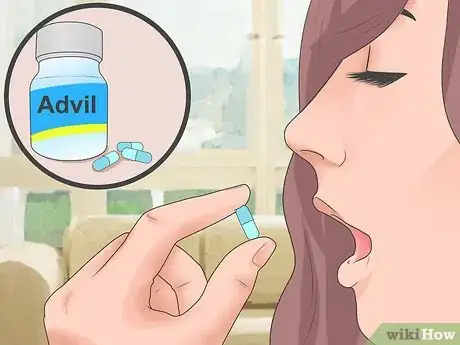
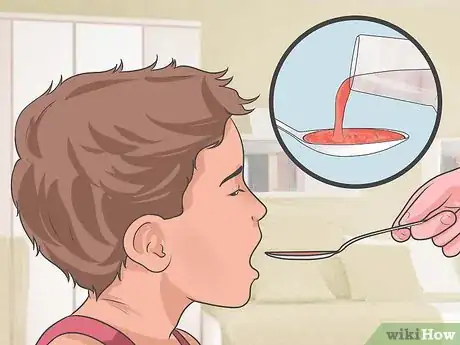
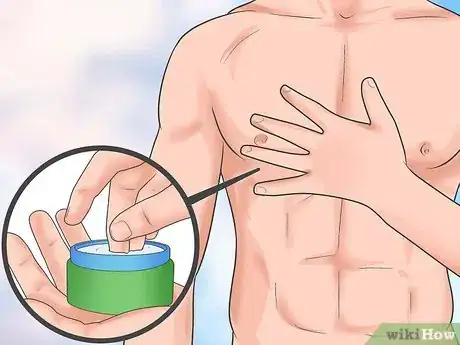
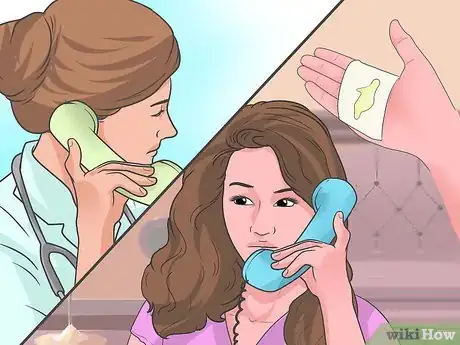

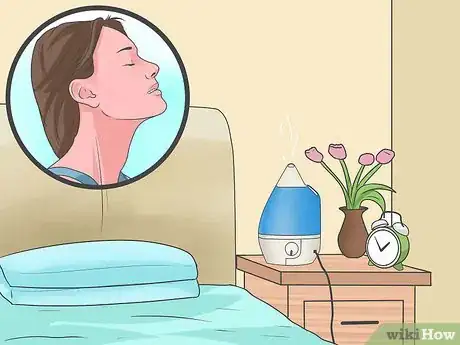
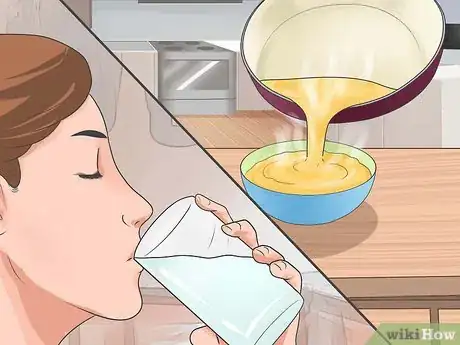
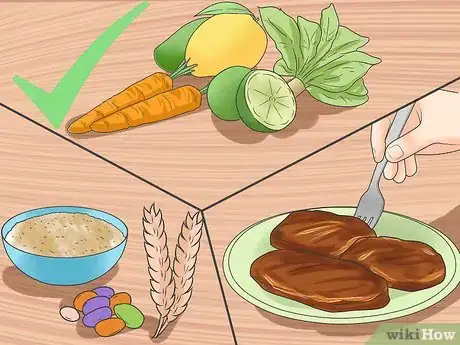

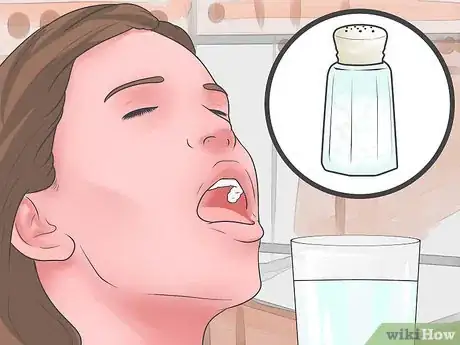
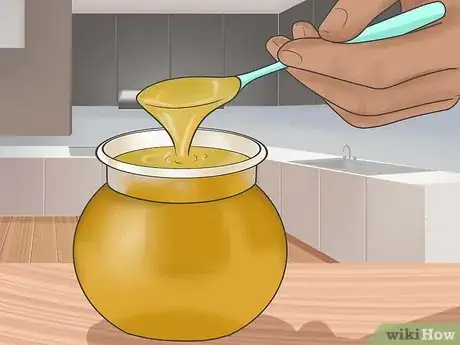



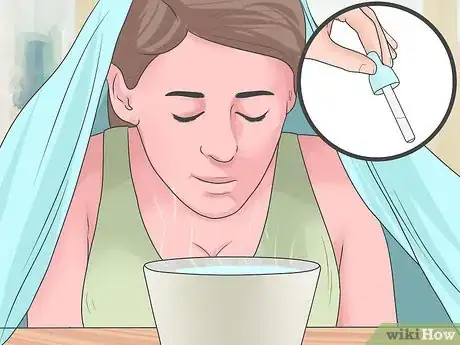
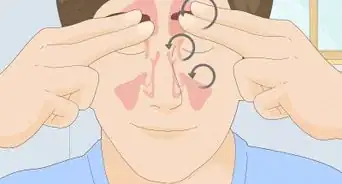

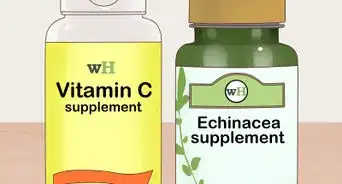



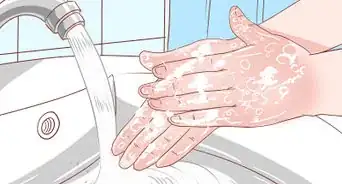
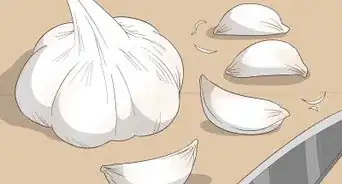
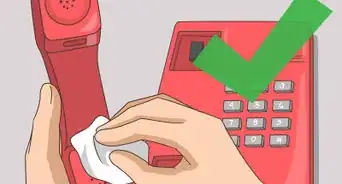


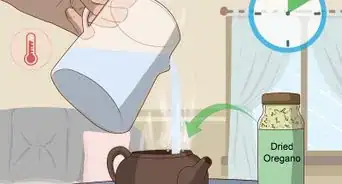
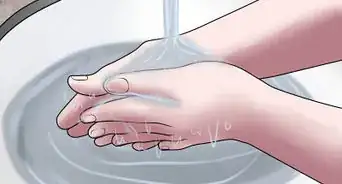









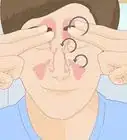

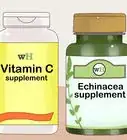
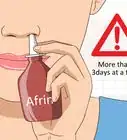



































Medical Disclaimer
The content of this article is not intended to be a substitute for professional medical advice, examination, diagnosis, or treatment. You should always contact your doctor or other qualified healthcare professional before starting, changing, or stopping any kind of health treatment.
Read More...